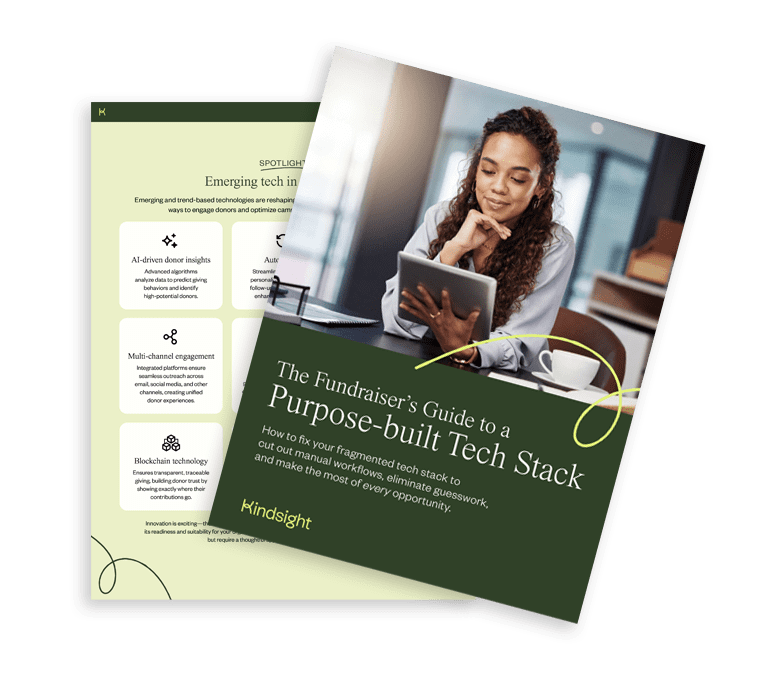
So, you need a CRM for your nonprofit. Whether you are switching from your current software or starting from scratch, this is a big decision for your organization. There are so many aspects to look at when considering nonprofit CRM solutions, some of which are standard and some that are very unique to your organization.
A CRM (customer relationship management) system is software designed to manage interactions with current and potential donors. Classic nonprofit CRM features include contact management, lead management, reporting, sales management, and more. It should also include automation features to save time, gift processing to smoothly receive donations, and marketing tools to make it easier to promote the business to new and existing customers.
The key thing to remember as a fundraising professional is how nonprofit CRMs differ from CRMs made for for-profit companies. Nonprofit CRMs include a variety of sector-specific features designed to help you with your donor management, rather than focusing on traditional sales customer management. For example, some key features usually included are volunteer and member management, grant tracking, and event planning.
We have compiled a list of CRM options that speak to different types of fundraising organizations and sectors (education, healthcare, and nonprofits) and stages in your fundraising journey (small to large organizations). We’ve also explained which factors to consider when choosing the right CRM for you and your team.
Kindsight’s ascend CRM is included in this list, as well as CRMs with integrations with Kindsight’s iwave (Salesforce, Raiser’s Edge NXT, DonorPerfect, Neon One). Each has its strengths and weaknesses, and the type of organization it works best with.
1. ascend by Kindsight
Best for: Education and healthcare advancement teams, and large nonprofit organizations
ascend, built on Salesforce (mentioned later on in the list), is designed to be ultra-customizable and scalable. ascend is a flexible donor management system and can be adapted to the user’s unique needs.
This is particularly useful for higher education and healthcare, and larger nonprofit institutions that need a tailored system and robust functionality. ascend allows for donor segmentation, personalized communications, automated email responses, and advanced analytics to enhance fundraising campaigns.
Key features:
- Comprehensive donor database
- Prospect management
- Simplified gift processing
- HIPAA compliant
- Multiple integrations (including proprietary tools to integrate third-party data seamlessly)
- Batch processing
- Grateful patient program module
- Mobile and web access
2. Bloomerang
Best for: Small to medium-sized organizations
Known for its user-friendly interface, Bloomerang strongly focuses on donor retention. This combination means that your team can learn it quickly and hit the ground running with fundraising. It also has a tiered pricing structure, which makes it a decent choice for small to medium-sized organizations.
Key features:
- Donor database management
- Customizable dashboard
- Email marketing integration
- Online donation forms
3. Bonterra
Best for: Connecting to corporate partners
Bonterra provides a suite of integrated solutions created to meet the needs of nonprofits. This makes it a versatile choice for organizations looking to manage multiple parts of their operations in one tool.
Bonterra offers features that particularly support nonprofits in connecting to corporate partners looking to donate to nonprofits. Pricing depends on the size of your business and the different solutions you want to use. This means the price can vary dramatically depending on your needs.
Key features:
- Grant management
- Volunteer management
- Fundraising tools
- Donor management
Need help with your tech stack?
Fundraising teams face an abundance of manual tasks and disconnected, outdated systems. Our guide will give you actionable strategies for overcoming tech obstacles and unlocking fundraising opportunities.

4. Blackbaud (Raiser’s Edge NXT)
Best for: Very large databases
Blackbaud was created for nonprofits and is best for medium to large organizations with a large database. Some drawbacks are that the data can be siloed because each module is built separately, and the platform is proprietary so it’s often difficult to integrate with.
Key features:
- Cultivation tools
- Built-in analytics
- Data enrichment
- Built-in email campaign capabilities
5. CharityEngine
Best for: International fundraising
CharityEngine gives you a comprehensive CRM platform that focuses on increasing fundraising effectiveness. It does this by providing a variety of tools to help nonprofits improve their operations and enhance their donor engagement.
CharityEngine supports international nonprofit operations, by offering multi-currency support and international security measures. They offer two different pricing levels, depending on the size of your nonprofit.
Key features:
- Online fundraising tools
- Marketing automation
- Event management
- Donor management
6. DonorPerfect
Best for: Small organizations
DonorPerfect is a solid CRM for nonprofits because of its donor management and fundraising features. Their lowest pricing tier is also quite affordable, which makes it good for smaller nonprofits. It includes some customization options, making it useful for a range of nonprofit organizations, although its functionality is less extensive than the slightly more expensive options.
Key features:
- Donor profiling
- Grant management
- Fundraising campaign management
- Reporting and analytics
7. Keela
Best user interface
Another CRM specifically designed for nonprofit organizations, Keela includes a decent variety of features to help you manage donor relationships and improve fundraising efforts. Its user-friendly interface makes it a good option for small to medium-sized nonprofits that want to minimize training time. Pricing is based on the number of contacts you store, starting at $125 a month (2025 pricing).
Key features:
- Contact management
- Email marketing
- Reporting and analytics
- Fundraising tools
8. Little Green Light
Best for: Low-budget teams
Designed for smaller nonprofits, Little Green Light is a simple, affordable CRM. Its features help organizations manage their donor relationships without overwhelming users. Because it’s aimed at small nonprofits, the price reflects this: just $45 per month. This makes it a good option for the budget-conscious nonprofit.
Key features:
- Online donation forms
- Email marketing
- Reporting and analytics
- Event management
9. Neon One CRM
Best for: Basic use
Marketed as an ‘all-in-one’ CRM for small to midsize nonprofits, Neon One CRM focuses on the basics of constituent management. This includes automation features designed to save you time in your fundraising. Their pricing is based on your revenue, though, so you need to be mindful of the increased cost as you grow.
Key features:
- Fundraising tools
- Donor management
- Event management
- Website integration
10. Salesforce
Best for: Tech-savvy teams
Salesforce is a customizable platform that includes robust features to help companies organize and manage their clients. Although not initially built for nonprofits, you can still use its varied features to manage donor relationships and analyze your fundraising performance.
Salesforce can be expensive for smaller nonprofits, though, so you might need to look for discounts to get the best value for money. It also tends to require more technical expertise if making adjustments or configurations.
Key features:
- Fundraising tracking
- Program management
- Marketing and communication tools
- Reporting and analytics
11. Virtuous
Best for: Automation
Claiming to be the only ‘Responsive Fundraising Platform’, Virtuous is focused on creating personalized donor experiences and automating fundraising processes. It also includes some useful marketing tools, which are useful as you try to grow a smaller nonprofit. Their pricing goes up based on functionality and the number of supporter records you keep, so it’s worth considering the potential price increase as you need more capabilities or reach more potential donors.
Key features:
- Marketing automation
- Donor management
- Project management
- Gift processing
Benefits of CRM in fundraising
A CRM can have a huge positive impact on education, healthcare, and nonprofit organizations. It allows organizations to consolidate and analyze all donor and prospect information in one place.
It also supports your donor engagement efforts, as you can create and send personalized communications based on donor profiles and history, and identify trends to help prioritize your fundraising strategy. Some notable nonprofit-specific benefits include:
- Enhanced donor relations: Tailoring your communication and engagement strategies makes it faster and easier to build and nurture relationships with your donors.
- Better donor retention: By identifying trends and patterns in donor behavior, you’re able to implement targeted retention strategies that will increase loyalty.
- Streamlined donation processes: Using automation, you can speed up donation tracking, processing, and receipting. This reduces administrative time and costs while making the whole process work more efficiently.
- Increased collaboration: Bringing everything into one platform makes it easier for your team to collaborate and share information.
- Greater fundraising insights: Using reporting and data analytics tools, you’re able to evaluate donor data to uncover ways to raise more funds and decide on new fundraising strategies.
Key features of nonprofit CRM software
Your nonprofit CRM should offer some essential features, from campaign management that fuels your mission to analytics that illuminate your path forward. These tools can enhance your impact, streamline your efforts, and help you organize a community of passionate supporters. In addition to the below, check out our list of 15 most important features every nonprofit CRM should have.
Donor management
Donor management is an important feature because it combines all donor information, enhances relationship management, and makes it possible to segment your donors. This segmentation can be used to categorize donors based on interests and giving patterns (once-off, sporadic, recurring, corporate, planned giving, and major donors), which means you can target your outreach and send personalized communications.
Fundraising tools and campaign management
The primary goal of a nonprofit is to fulfill its mission, and to do so, it needs to raise funds, which is why the fundraising and campaign management features are so important. These tools allow you to plan, execute, and track your fundraising campaigns. They also allow you to create and manage multiple campaigns at the same time, set fundraising goals and priorities, and monitor your fundraising progress in real time.
Analytics and reporting
In order to make well-informed decisions, you need to be able to look at the facts and data in a structured and easy-to-digest way. This is where fundraising analytics and reporting are critical. They transform your raw donor data into actionable insights.
They also make it possible to measure the effectiveness of your fundraising strategy, track engagement, and identify trends. Robust reporting and analytics allow your organization to become data-decision-driven rather than making decisions based on feelings and intuition alone.
In good decision-making, both data and intuition are necessary. However, data-driven organizations are three times more likely to report significant improvements in decision-making than organizations that leverage data less.
Integration with other nonprofit software
Even though the CRMs have a lot of features, they can’t do everything for every organization. So your CRM needs to be able to communicate with your other tools seamlessly. This is where integrations become vital to your internal tech stack. They enable you to connect all your operations, removing data silos, and improving your overall efficiency.
Data security and compliance
The biggest risk with collecting and storing donor data is ensuring it’s both secure and stored compliantly. That’s because you’re likely storing PII (Personally Identifiable Information), which could cause genuine harm if it gets into the wrong hands. There can also be financial and legal ramifications if it’s found that you failed to adhere to legal and regulatory requirements.
Customizations
Every nonprofit is different, so it’s important your CRM is able to meet your unique needs. This is why it’s essential that you can tailor your CRM to match your organization’s specifications and workflows. You want your CRM to reflect your fundraising strategies and data requirements. This can include custom fields, modified data structures, and personalized reports.
Choosing the best CRM software for nonprofits
Clearly, there are many options when it comes to choosing a nonprofit CRM. Below is a quick list of things to keep in mind when making this important decision. If you want to learn more, check out our blog about creating a CRM RFP that breaks it down into more detail.
- Define requirements: The first step is to identify exactly what your nonprofit needs from its CRM. List the functionality you know you need, such as donor management, volunteer tracking, and reporting.
- Set a budget: Consult with key stakeholders to decide what your budget will be. Consider the different pricing models, additional costs, and long-term financial stability.
- Compare options: Using the summaries above, and your own research, compare the different CRMs available to you, comparing them with the list of features you made in step 1.
- Request demos: Once you have a shortlist of a few options, the next step is to arrange a demo to help you get a clear idea of how the software actually works and ensure it really does tick all the boxes.
- Make a decision: At this point, you’re ready to choose the best nonprofit CRM software for your needs and budget. Then, you can make a commitment and start planning implementation and onboarding for stronger donor relationships and more effective fundraising.
If you need help with what questions to ask vendors when choosing a CRM, check out our comprehensive cheat sheet.
Be the first to read our resources.
The world is changing quickly—and our resources help you stay on top of it all. Sign up to get new insights, success stories, and more, sent right to your inbox.



